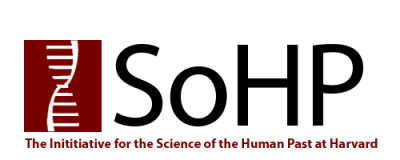The Encounter of Science and History
Inaugural Conference of the Initiative for the Science of the Human Past at Harvard
Friday November 1, 2013
Knafel Center Gymnasium, Radcliffe Institute for Advanced Study
Harvard University
Leading scholars and scientists convened at Harvard University to present and discuss their latest findings in the new scientific history and archaeology of the human past. They seek to dissolve the barriers between prehistory and history, bring the sciences and humanities back into dialogue and illuminate critical aspects of our human past that were unimaginable even a few years ago. Their discoveries are at the heart of the research and teaching of the Initiative for the Science of the Human Past at Harvard.
Program
Download a full copy of the program, including abstracts
8:00 Coffee and continental breakfast
8:45 Welcome (Introduction by Michael McCormick (History) and Alan Garber (Provost)
9:00 Pardis Sabeti, Organismic and Evolutionary Biology, Harvard, and Broad Institute at MIT and Harvard “Evolutionary Forces in Humans and Pathogens”
Introduced by Alan Garber, Provost of Harvard University
9:30 Brief comment and discussion: Nick Patterson, Broad Institute at MIT and Harvard; SoHP, Harvard
9:45 Johannes Krause, Institute of Scientific Archaeology, University of Tübingen, “Ancient Pathogen Genomics: What we learn from Ancient and Medieval Diseases”
10:15 Brief comment and discussion: Richard M. Losick, Molecular and Cellular Biology, Harvard
10:30 Coffee
11:00 Kyle Harper, Classics, University of Oklahoma, “Population, Disease and the Fall of the Roman Empire: A Biohistory”
11:30 Brief comment and discussion: Mark Schiefsky, Classics, Harvard
11:45 Lunch
1:00 Michael McCormick, History and SoHP, Harvard, “Ancient and Medieval Climate Change and the Future of Humanity”
1:30 Brief comment and discussion: Emma Dench, Classics and History, Harvard
1:45 David Reich, Genetics, Harvard Medical School; SoHP, Harvard, “Insights into human population history from a high coverage Neandertal genome”
2:15 Brief comment and discussion: Daniel Lord Smail, History and SoHP, Harvard
2:30 Daniel Lieberman, Human Evolutionary Biology, “How did Early Humans Hunt?”
3:00 Brief comment and discussion: Joyce Chaplin, History, Harvard
3:15 Coffee
3:45 Noreen Tuross, Human Evolutionary Biology and SoHP, Harvard, “Humans Move: Evidence in Isotopes”
4:15 Brief comment and discussion: Scott Edwards, Scott Edwards, Organismic and Evolutionary Biology, Harvard
4:30 Ian Morris, Classics and History, Stanford University, “The Science of the Human Past”
5:00 Brief comment and discussion: Edward M. Hundert, Division of Medical Ethics, Harvard Medical School
5:15 Concluding remarks
5:30-6:30 Poster Session and Reception
“Giza 3D: Digital Archaeology and Scholarly Access to the Giza Pyramids,” Peter Manuelian
“Climatic Contributions to Subsistence Crises, Mass Mortalities and Social Conflict in Ireland, 425-1649 CE,” Francis Ludlow
“Digitizing the Roman Empire and Medieval Europe,” Brendan Maione-Downing
"Origin and history of domesticated cochineal (Dactylopius coccus) via genomic sequencing," Michael Campana
“Weaning times from archaeological bones using nitrogen isotope ratios: the known, the unknown and the unknowable,” Linda M. Reynard and Noreen Tuross
“A map of Neandertal ancestry in modern humans: insights into human history and biology,” Sriram Sankararaman
“Tracing the Dispersal of early Homo sapiens across Africa: Evidence from the Lake Victoria basin,” Christian Tryon
“Paleodiets, Cooking and Nitrogen Isotopes,” Elizabeth Harvey, Linda Reynard and Noreen Tuross
“Inoculation: Medical Cause for Controversy? Inoculation and final size in the 1721 Boston smallpox epidemic,” Marlee Chong
“In the Swamps: Physical Geography of Antebellum Rice Cultivation,” Samuel Coffin
“The Chemistry of Tyrian Purple: a Novel Application of Hyperspectral Imaging,” Marie Keil
“Thirsty Genes and Human Evolution: Did Environmental Selective Pressures Influence the Ability to Retain Salt?” Neil Patel
“Letters of an Evolutionary: A Look into the Correspondence of Charles Darwin,” Rachel Sapire
Cosponsored by the Broad Institute at MIT and Harvard, the Departments of Classics and History, the Medieval Studies Committee, and the Standing Committee on Archaeology, with the support of the Goelet-Berkowitz Fund.
